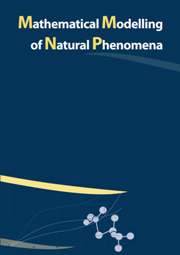Crossref Citations
This article has been cited by the following publications. This list is generated based on data provided by
Crossref.
Adimy, Mostafa
Crauste, Fabien
Hbid, My Lhassan
and
Qesmi, Redouane
2010.
Stability and Hopf Bifurcation for a Cell Population Model with State-Dependent Delay.
SIAM Journal on Applied Mathematics,
Vol. 70,
Issue. 5,
p.
1611.
Li, Michael Y.
and
Shu, Hongying
2011.
Multiple Stable Periodic Oscillations in a Mathematical Model of CTL Response to HTLV-I Infection.
Bulletin of Mathematical Biology,
Vol. 73,
Issue. 8,
p.
1774.
Adimy, M.
and
Crauste, F.
2012.
Delay Differential Equations and Autonomous Oscillations in Hematopoietic Stem Cell Dynamics Modeling.
Mathematical Modelling of Natural Phenomena,
Vol. 7,
Issue. 6,
p.
1.
Benchohra, Mouffak
Medjadj, Imene
Nieto, Juan J.
and
Prakash, P.
2013.
Global Existence for Functional Differential Equations with State-Dependent Delay.
Journal of Function Spaces and Applications,
Vol. 2013,
Issue. ,
p.
1.
Jalilian, Yaghoub
and
Jalilian, Reza
2013.
Existence of Solution for Delay Fractional Differential Equations.
Mediterranean Journal of Mathematics,
Vol. 10,
Issue. 4,
p.
1731.
Liang, Xiao
2013.
Asymptotic behavior of solutions of nonlinear models from erythropoiesis.
Advances in Difference Equations,
Vol. 2013,
Issue. 1,
Sánchez-Taltavull, Daniel
and
Alarcón, Tomás
2014.
Robustness of differentiation cascades with symmetric stem cell division.
Journal of The Royal Society Interface,
Vol. 11,
Issue. 95,
p.
20140264.
Sánchez-Taltavull, Daniel
2016.
Optimal architecture of differentiation cascades with asymmetric and symmetric stem cell division.
Journal of Theoretical Biology,
Vol. 407,
Issue. ,
p.
106.
Pujo-Menjouet, L.
and
Volpert, V.
2016.
Blood Cell Dynamics: Half of a Century of Modelling.
Mathematical Modelling of Natural Phenomena,
Vol. 11,
Issue. 1,
p.
92.
Alaidarous, Eman
Albarakati, Wafaa
Baliki, Abdessalam
and
Benchohra, Mouffak
2017.
Global existence and stability for functional evolution equations with state-dependent delay.
Revista de la Real Academia de Ciencias Exactas, Físicas y Naturales. Serie A. Matemáticas,
Vol. 111,
Issue. 1,
p.
15.
Ziaei, E
and
Farahi, M H
2019.
The approximate solution of non-linear time-delay fractional optimal control problems by embedding process.
IMA Journal of Mathematical Control and Information,
Vol. 36,
Issue. 3,
p.
713.
Afenya, Evans K.
Ouifki, Rachid
and
Mundle, Suneel D.
2019.
Mathematical modeling of bone marrow – peripheral blood dynamics in the disease state based on current emerging paradigms, part II.
Journal of Theoretical Biology,
Vol. 460,
Issue. ,
p.
37.

